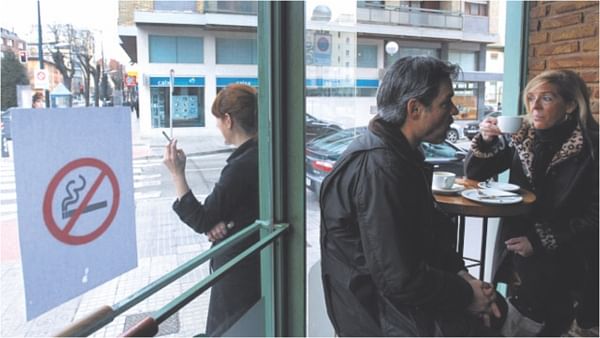| Home - Back Issues - The Team - Contact Us |
 |
| Volume 11 |Issue 27| July 07, 2012 | |
|
|
Straight Talk Smoke Free Zone Nadia Kabir Barb
The umbrella above my head was being particularly uncooperative and decided to turn itself inside out leaving me at the mercy of the droplets of rain that were fast gathering momentum. I suppose I should place the blame firmly on the blustery wind around me rather than the lack of craftsmanship of my umbrella. Given how much I was enjoying the heavy rain and windy weather, I was surprised to see a huddle of people standing outside the pub in front of me and also a smattering of smartly dressed professionals gathered outside what looked like an office block. As I got closer I noticed that most of them, in fact all of them, had a cigarette in their hands and it became obvious that the mini congregations were not necessarily standing in the miserable weather by choice but because of the fact that there is, and has been for the past five years, a smoking ban in all public places in the UK. In fact within the UK, Scotland was the first country to introduce the smoke free law in 2006. On the 2nd of April 2007, Wales followed suit and implemented the smoking ban and was followed closely on its heels by Northern Ireland where it came into force on the 30th of April 2007. England, straggling slightly behind, was the last to put the smoke free law into place and finally introduced it on the 1st of July 2007. I think the non smokers of the UK must have heaved a collective sigh of relief at this piece of legislation. This legislation bans people from smoking in workplaces or any enclosed public spaces such as shopping centres, restaurants, bars, cafes, cinema halls etc. The aim of the law was to try and reduce passive smoking or exposure to second hand smoke which results from breathing other people's smoke and is known to be harmful and can have long term health effects especially with prolonged exposure. Children are particularly vulnerable to this kind of involuntary smoking. For non smokers such as me it felt like a law that was long overdue and I wholeheartedly agree with the comment made by Amanda Sandford, research manager from Action on Smoking and Health (ASH) where she said “When it started people wondered why we'd waited so long to do it. Non-smokers always found it unpleasant breathing in other people's smoke...It is one of the most important public health acts in the last century. There's no question it's been hugely beneficial.”
It has already been established that smoking can cause coronary artery disease which increases the risk of a heart attack or stroke; it can cause huge damage to the lungs and massively increases the risk of lung cancer. We also know that smoking also increases the risk of other cancers such as oral, uterine, liver, kidney, bladder, stomach and cervical cancer. It has also been proved that smoking in pregnancy greatly increases the risk of miscarriage and is also associated with lower birth weight. To add to that we are now also aware that passive smoking has a detrimental effect as well. According to Action on Smoking and Health, 'exposure to second hand smoke has immediate health effects. It can reduce lung function; exacerbate respiratory problems; trigger asthma attacks; reduce coronary blood flow; irritate eyes; and cause headaches, coughs, sore throats, dizziness and nausea. There is no safe level of exposure to tobacco smoke and there are long-term health effects, especially with continued exposure over time.' Prior to the smoke free law being implemented, there was a fear that it might affect the hospitality industry negatively as people would not frequent bars or restaurants as regularly due to the fact that they would be unable to smoke within these public areas. According to the BBC news, 'A review of the evidence on the impact of the law in England was commissioned by the government and carried out by Prof Linda Bauld from the University of Stirling and the UK Centre for Tobacco Control Studies. Professor Bauld's report concluded: "The law has had a significant impact...Results show benefits for health, changes in attitudes and behaviour and no clear adverse impact on the hospitality industry." Interestingly enough, Bangladesh Parliament implemented a smoking ban in 2005, prior to the UK. The smoke free law does not allow smoking in certain public places such as airports, cinema halls, covered shopping centres and workplaces such as healthcare and educational institutions. There is also a ban on certain forms of public transport. The law does, however, permit the establishment of designated smoking areas in many other public places and work places especially if they are not enclosed areas. Unlike the UK, there is no prohibition on smoking in many restaurants and hotels. There is also a fine of 50 taka if people are caught smoking in public places stated under the law. In hindsight, it seems ludicrous that a few years a go there was a designated non smoking area and smoking area situated right next to one another in offices, waiting areas, restaurants and on board planes. Did people think that by virtue of the fact that there was a verbal or written delineation that the smoke would suddenly stop at the given demarcation! These days it is a wonderful feeling to be able to sit in a restaurant or cafe and enjoy the food without having to inhale a puff of someone else's cigarette smoke with every mouthful or sit through a long haul flight being surrounded by passengers smoking like industrial chimneys. I am sure many of you would concur (especially the non smokers among you out there) that It is also refreshing to be able to return home without your hair and clothes smelling like you had been socialising with an ashtray. We have now implemented a similar ban within our household and when we have guests who wish to smoke they too have to brave the elements and smoke in our patio or balcony. If that is not deterrent enough, it is accompanied by a brief 'smoking can kill' diatribe by yours truly! There are many who may feel that I am being unduly harsh or extreme but it is hard to condone an activity that is detrimental to the health of the participant and those around them. Smoking is self harm but because there are no visible physical injuries or marks, and it is still socially accepted, it is possible for people to ignore the effects of smoking and the harm it causes to others.
Copyright
(R) thedailystar.net 2012 |

